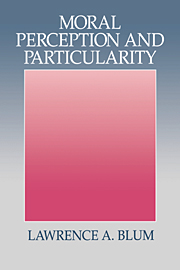Book contents
8 - Compassion
Published online by Cambridge University Press: 12 January 2010
Summary
This chapter offers an account of compassion as a moral phenomenon. Compassion is a kind of emotion or emotional attitude; though it differs from paradigmatic emotions such as fear, anger, distress, love, it has, I will argue, an irreducible affective dimension.
Compassion is one among a number of attitudes, emotions, or virtues which can be called “altruistic” in that they involve a regard for the good of other persons. Some others are pity, helpfulness, well-wishing. Such phenomena and the distinctions between them have been given insufficient attention in current moral philosophy. By distinguishing compassion from some of these other altruistic phenomena I want to bring out compassion's particular moral value, as well as some of its limitations.
My context for this inquiry is an interest in developing an alternative to Kantianism, in particular to its minimization of the role of emotion in morality and its exclusive emphasis on duty and rationality. I am influenced here by Schopenhauer's critique of Kant's ethics and by his view of compassion as central to morality. But discussion of the specific views of these two philosophers will be peripheral to my task here.
THE OBJECTS OF COMPASSION
How must a compassionate person view someone in order to have compassion for him? Compassion seems restricted to beings capable of feeling or being harmed. Bypassing the question of compassion for plants, animals, institutions, I will focus on persons as objects of compassion.
- Type
- Chapter
- Information
- Moral Perception and Particularity , pp. 173 - 182Publisher: Cambridge University PressPrint publication year: 1994
- 2
- Cited by



